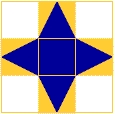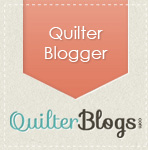working out the first circular flower for Diamond Hill
The purple petals were turned under using a Bostik washable glue stick (I've been using that brand for years for foundation piecing), then I used Burrows clear gum from Officeworks to baste the petals onto the vanilla circle.
How do I remove the freezer paper?
In the past when using a single layer of freezer paper, I have stitched around the freezer paper, leaving it in until fully stitched. Then I would cut a slit in the background fabric, and remove the freezer paper there. No freying ever occurs as the applique on top prevents exposure of the slit on the top, and once it's quilted nothing can be seen at the back.
back of Diamond Hill block 1, made using my usual needleturn technique
Even when I have handled blocks for years (as in my Baltimore album blocks which literally took 10 or 15 years to make, and aren't even assembled into a quilt top yet, and Civil War Bride blocks), no damage has occurred by cutting a slit, and no glues were left in the fabric.
The edges on the purple petals above are turned under with glue, and stuck to the freezer paper. I think I will have to hand swish/wash the block to remove the glue before I can cut a slit and pull away the freezer paper without damaging my stitches. Then, a yellow circle is to be appliqued over the centre of the petals.
Now I am looking at the next circular flower which is different again.
If I made every petal individually and stitched them, I would have to cut the freezer paper slightly smaller than marked line to account for the thickness of the fabric in the turned under section, then try to line up the outside to make a circle.
Esther also has a tutorial on how to machine stitch those seams when making leaves, but I estimate it would be a bit frustrating for me on a circle where I want the outside to line up perfectly into a circle.
Esther has another tutorial on how to use Floriani fusible stitch n wash, but that still requires ironing over the seam with a starch product, not glueing. I am finding the ironing over to be a bit heavy on my arm, and not all the curved edges are as curved as I would like using the ironing over technique. Hence, why I wanted to try the glue.
There are two circular flowers in the pattern above. I am still wondering whether to use this technique: applique 4 parts onto a large piece of circle fabric, stitch, wash to remove glue, cut slits to remove freezer paper inserts, then iron on a large circle template onto the back, cut out, glue and applique, then wash again later to remove glue, then cut a slit to remove freezer paper. OR this technique: applique background circle first, wash, cut a slit to remove freezer paper, position petals, stitch, wash again.
Either way, with this many layers I see the block being washed at least twice. It's going to be a matter of getting all the flowers to a certain point, then washing to remove glue, cut a slit to remove freezer paper, then add second layer with a second washing at the very end.
I really don't want to wash the block more than twice.
The reason I am trying all these gluing things is to improve the placement of my applique, as without basteing, it seems to migrate all over the place while I sew.
Maybe I just need to try a different iron, and take more time. I have just seen the Petite Press Portable Mini Iron, which looks like you can apply pressure with a finger.
And I've just done a little bit of youtube research.. I think I'll buy the Roxanne glue baste, the Sewline glue stick and the Floriani fuse and wash papers. Giving it a go on this applique journey!
I welcome your ideas, and sharing of your experience with any of these techniques in the comments below.
Thank you.



































 Quilter Blogs & Store Search
Quilter Blogs & Store Search


No comments:
Post a Comment